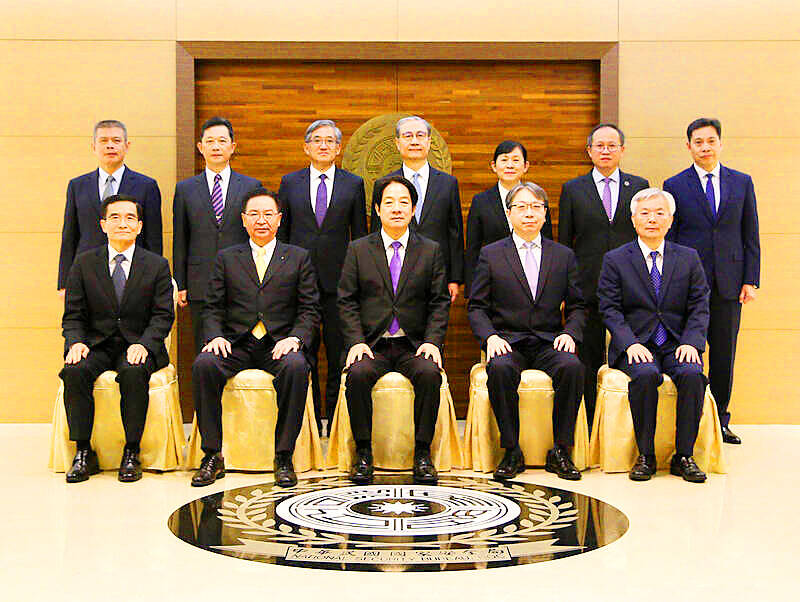The National Security Council (NSC) has published its information security strategy for this year, which includes establishing a national center to monitor security risks and outlines three major goals for enhancing the nation’s critical infrastructure security.
The council’s strategy highlights the importance of protecting critical infrastructure — including water, electricity, communications, transportation, finance and healthcare systems — from cyberthreats.
Disruptions to these systems caused by cyberattacks could paralyze society, severely impact the economy, jeopardize public safety and disrupt daily life, the NSC said. Such incidents would also erode public trust in the government and threaten national stability.

Photo coutesy of the National Security Bureau
The strategy emphasizes that information security is crucial in safeguarding the military’s operational command system, ensuring that facilities, equipment, communications and decision-making processes remain free from external interference.
Information security is a critical extension of national defense and military strategy, the council said.
The military must be able to counter cyberattacks to prevent adversaries from compromising defense systems, stealing sensitive information or crippling operational capabilities, the council said.
Homeland security and the protection of critical infrastructure constitute one of the strategy’s four central pillars, supported by three primary objectives.
The first objective is to conduct comprehensive assessments of potential information security risks and develop countermeasures to bolster critical infrastructure protection and defense readiness.
The second aims to strengthen national defense, public welfare, disaster preparedness and democratic resilience through robust regulation and enforcement of cybersecurity standards.
The third objective is to enhance information security preparedness to safeguard national security and ensure regional peace and stability.
As a concrete step, the strategy calls for the establishment of a national information security center to monitor nation-level security risks. The center would bolster interagency coordination and response mechanisms, ensuring that resources can be rapidly mobilized to address major cybersecurity incidents, it said.
The strategy also said the government should clearly define information security objectives and requirements for defense and law enforcement agencies, and recommends prioritizing the allocation of resources toward intelligence gathering, threat analysis, and the development of proactive defense capabilities.
In addition, the strategy recommends that the government conduct a comprehensive inventory of key agencies and critical infrastructure facilities, categorize them by risk level, and regularly review them to ensure compliance with security regulations.
It also calls for stronger oversight of critical infrastructure facilities, enforcement of incident investigation and accountability mechanisms, and the assurance that all agencies meet established information security standards.
National security and information security agencies should work with critical infrastructure operators to implement a comprehensive action plan aimed at enhancing network resilience, it said.
The strategy also urges the establishment of an interagency coordination platform to strengthen operational resilience during emergencies.
Furthermore, it proposes the creation of a dedicated information security protection team to be able to rapidly respond to emergencies involving critical infrastructure.
Third-party information security drills and tabletop exercises should be established to test and verify information security defense and response mechanisms, it said.

Intelligence agents have recorded 510,000 instances of “controversial information” being spread online by the Chinese Communist Party (CCP) so far this year, the National Security Bureau (NSB) said in a report yesterday, as it warned of artificial intelligence (AI) being employed to generate destabilizing misinformation. The bureau submitted a written report to the Legislative Yuan in preparation for National Security Bureau Director-General Tsai Ming-yen’s (蔡明彥) appearance before the Foreign Affairs and National Defense Committee today. The CCP has been using cognitive warfare to divide Taiwanese society by commenting on controversial issues such as Taiwan Semiconductor Manufacturing Co’s (TSMC, 台積電) investments in the

INVESTIGATION: The case is the latest instance of a DPP figure being implicated in an espionage network accused of allegedly leaking information to Chinese intelligence Democratic Progressive Party (DPP) member Ho Jen-chieh (何仁傑) was detained and held incommunicado yesterday on suspicion of spying for China during his tenure as assistant to then-minister of foreign affairs Joseph Wu (吳釗燮). The Taipei District Prosecutors’ Office said Ho was implicated during its investigation into alleged spying activities by former Presidential Office consultant Wu Shang-yu (吳尚雨). Prosecutors said there is reason to believe Ho breached the National Security Act (國家安全法) by leaking classified Ministry of Foreign Affairs information to Chinese intelligence. Following interrogation, prosecutors petitioned the Taipei District Court to detain Ho, citing concerns over potential collusion or tampering of evidence. The

‘COMPREHENSIVE PLAN’: Lin Chia-lung said that the government was ready to talk about a variety of issues, including investment in and purchases from the US The National Stabilization Fund (NSF) yesterday announced that it would step in to staunch stock market losses for the ninth time in the nation’s history. An NSF board meeting, originally scheduled for Monday next week, was moved to yesterday after stocks plummeted in the wake of US President Donald Trump’s announcement of 32 percent tariffs on Taiwan on Wednesday last week. Board members voted to support the stock market with the NT$500 billion (US$15.15 billion) fund, with injections of funds to begin as soon as today. The NSF in 2000 injected NT$120 billion to stabilize stocks, the most ever. The lowest amount it

NEGOTIATIONS: Taiwan has good relations with Washington and the outlook for the negotiations looks promising, Minister of Economic Affairs J.W. Kuo said Taiwan’s GDP growth this year is expected to decrease by 0.43 to 1.61 percentage points due to the effects of US tariffs, National Development Council (NDC) Minister Paul Liu (劉鏡清) said at a meeting of the legislature’s Economics Committee in Taipei yesterday, citing a preliminary estimate by a private research institution. Taiwan’s economy would be significantly affected by the 32 percent “reciprocal” tariffs slapped by the US, which took effect yesterday, Liu said, adding that GDP growth could fall below 3 percent and potentially even dip below 2 percent to 1.53 percent this year. The council has commissioned another institution